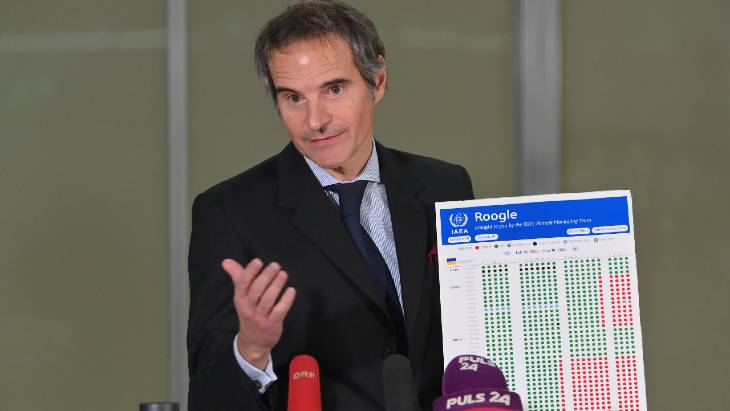The director general of the International Atomic Energy Agency (IAEA), Rafael Mariano Grossi, has said that he was hoping to present "quite detailed" proposals to both sides after discussions about the safety of nuclear sites with the Russian and Ukrainian foreign ministers in Turkey on Thursday.
In a media conference after the “constructive” meetings on 10 March, he said: "The aim of the conversations was to discuss the general approach and whether I can have something that they could be able to work with.
"We are going to be presenting quite detailed ideas in the next few hours, to both sides … after I could confirm that both sides are ready and disposed to work with us on this specific issue. And then we'll take it from there.
"I hope that I'll be able to work on a series of different aspects ranging from technical advice on a number of things, moving on to the facilitation, which is very important, of the supply chain that all these facilities require which is now interrupted - and up to the possible presence of our experts there."
His efforts are being backed by the nuclear industry. A joint statement issued by the Canadian Nuclear Association, Foratom, Nuclear Energy Institute, Nuclear Industry Association, World Nuclear Association and World Nuclear Transport Institute said they "applaud and endorse" the efforts being made to establish a framework to ensure the safety and security of nuclear facilities in Ukraine.
They add that "we ask all parties to continue participating constructively in this initiative, in order to formalise concrete steps for the implementation of such a framework, and to ensure no further military attacks on nuclear facilities. It is especially important to ensure immediately the well-being of staff working at Chernobyl and the Zaporozhe nuclear power plant. We commend the staff at those sites for their dedication and exemplary professionalism during these extremely difficult circumstances."
Ukraine 'to switch fuel suppliers'
According to the State Nuclear Regulatory Inspectorate of Ukraine’s (SNRIU's) update at 08:00 (06:00 GMT) on Friday, all Ukraine's nuclear plants continue to operate within safe operation limits, with eight of the country's 15 nuclear power units operating.
It also said that there was an IAEA inspection of the Khmelnytskyi nuclear power plant taking place as part of the agreement of the Treaty on the Non-Proliferation of Nuclear Weapons.
Ukraine's nuclear power plant operator Energoatom, meanwhile, is looking to switch from the use of Russian fuel, according to an interview CEO Petro Kotin gave to the Interfax Ukraine news agency.
"We are fully prepared to refuse the supply of Russian fuel to the territory of Ukraine and to ensure the stable operation of our power units without it. Westinghouse is ready to fully help us according to preliminary agreements," Kotin said.
As of mid-2021, six of the country’s 15 nuclear power units were using Westinghouse fuel, and Interfax Ukraine quotes Kotin as saying there will also be in-house production of fuel assemblies: "Thus, part of nuclear fuel will be produced in Ukraine, part - at Westinghouse sites."
Concern over Chernobyl
The European Bank for Reconstruction and Development (EBRD), which has been managing more than EUR2.5 billion (USD2.75 billion) to transform the Chernobyl site since 1995, said it was "extremely concerned" by recent developments there.
It said "recent events are putting in jeopardy the achievements of decades of successful international collaboration to secure the site" and "transform Chernobyl into an environmentally safe and secure site".
In its update on the evening of 10 March the IAEA also "expressed alarm about the deteriorating and exhausting conditions for staff at the Chornobyl NPP, who have not been able to rotate since the day before Russian forces took control on 24 February."
It said that, although a total loss of power to Chernobyl would not have a critical impact on safety functions at the site, it would worsen the radiation safety conditions for staff at the site. It has also warned that it has lost automated data transmissions from the safeguards systems at Chernobyl and Zaporozhe.
There were reports on Thursday that Belarus had been asked by Russia to supply power to Chernobyl using a power line dating back to the Soviet era, which has been mothballed. But the IAEA said that it was not able to confirm whether or not power had been restored.
In an update at 15:05 on Friday, SNRIU said that the loss of communications meant the situation at Chernobyl was "currently unknown" but it said "an additional supply of diesel fuel for diesel generators ensuring emergency power supply to the spent nuclear fuel storage facilities (ISF-1 and ISF-2), as well as to the New Safe Confinement above the Shelter, was delivered to the plant site. Attempts to restore the external power supply to the site are in progress."
It also said the building housing the Neutron Source facility at the Kharkov Institute of Physics and Technology, which is used for research and to produce radioisotopes for medical and industrial applications, had suffered fresh "minor damage" during shelling on Thursday. SNRIU said on Friday that the "power supply to the systems/components important to safety has been restored and damage which would affect the state of nuclear and radiation safety have not been detected. The radiation situation on the site is within the standard limits."







_15863.jpg)







